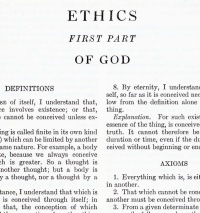Ethics
From The Art and Popular Culture Encyclopedia
(Difference between revisions)
| Revision as of 00:39, 10 February 2008 Jahsonic (Talk | contribs) ← Previous diff |
Revision as of 21:12, 14 March 2010 Jahsonic (Talk | contribs) Next diff → |
||
| Line 1: | Line 1: | ||
| [[Image:Ethics by Spinoza.jpg|Spinoza's|thumb|right|200px|By virtue of his [[magnum opus]], the posthumous ''[[Ethics (book)|Ethics]]'', [[Spinoza]] is considered one of [[Western philosophy|Western philosophy's]] definitive ethicists.]] | [[Image:Ethics by Spinoza.jpg|Spinoza's|thumb|right|200px|By virtue of his [[magnum opus]], the posthumous ''[[Ethics (book)|Ethics]]'', [[Spinoza]] is considered one of [[Western philosophy|Western philosophy's]] definitive ethicists.]] | ||
| {{Template}} | {{Template}} | ||
| - | '''Ethics''' (from the [[Ancient Greek]] ''ēthikos'', the [[adjective]] of ''ēthos'' "custom, habit"), a major branch of philosophy, is the study of [[Value theory|value]]s and [[Custom (law)|custom]]s of a person or group. It covers the [[Philosophical analysis|analysis]] and employment of [[concept]]s such as [[right]] and [[wrong]], [[good and evil]], and [[moral responsibility|responsibility]]. It is divided into three primary areas: ''meta-ethics'' (the study of the concept of ethics), ''normative ethics'' (the study of how to determine ethical values), and ''applied ethics'' (the study of the use of ethical values).{{GFDL}} | + | '''Ethics''' (from the [[Ancient Greek]] ''ēthikos'', the [[adjective]] of ''ēthos'' "custom, habit"), a major branch of philosophy, is the study of [[Value theory|value]]s and [[Custom (law)|custom]]s of a person or group. It covers the [[Philosophical analysis|analysis]] and employment of [[concept]]s such as [[right]] and [[wrong]], [[good and evil]], and [[moral responsibility|responsibility]]. It is divided into three primary areas: ''meta-ethics'' (the study of the concept of ethics), ''normative ethics'' (the study of how to determine ethical values), and ''applied ethics'' (the study of the use of ethical values). |
| + | ==See also== | ||
| + | * [[Altruism (ethics)]] | ||
| + | * [[Bioethics]] | ||
| + | * [[Buddhist Ethics (discipline)]] | ||
| + | * [[Business ethics]] | ||
| + | * [[Deontological ethics]] | ||
| + | * [[Engineering ethics]] | ||
| + | * [[Environmental ethics]] | ||
| + | * [[Ethical egoism]] | ||
| + | * [[Ethical relativism]] | ||
| + | * [[Ethical skepticism]] | ||
| + | * [[Ethical subjectivism]] | ||
| + | * [[Ethics in religion]] | ||
| + | * [[Fallibilism]] | ||
| + | * [[Foucault/Habermas debate]] | ||
| + | * [[Journalism ethics]] | ||
| + | * [[Legal ethics]] | ||
| + | * [[List of ethics topics]] | ||
| + | * [[Medical ethics]] | ||
| + | * [[Moral absolutism]] | ||
| + | * [[Moral nihilism]] | ||
| + | * [[Moral syncretism]] | ||
| + | * [[Morality]] | ||
| + | * [[Normative ethics]] | ||
| + | |||
| + | {{GFDL}} | ||
Revision as of 21:12, 14 March 2010

By virtue of his magnum opus, the posthumous Ethics, Spinoza is considered one of Western philosophy's definitive ethicists.
|
Related e |
|
Featured: |
Ethics (from the Ancient Greek ēthikos, the adjective of ēthos "custom, habit"), a major branch of philosophy, is the study of values and customs of a person or group. It covers the analysis and employment of concepts such as right and wrong, good and evil, and responsibility. It is divided into three primary areas: meta-ethics (the study of the concept of ethics), normative ethics (the study of how to determine ethical values), and applied ethics (the study of the use of ethical values).
See also
- Altruism (ethics)
- Bioethics
- Buddhist Ethics (discipline)
- Business ethics
- Deontological ethics
- Engineering ethics
- Environmental ethics
- Ethical egoism
- Ethical relativism
- Ethical skepticism
- Ethical subjectivism
- Ethics in religion
- Fallibilism
- Foucault/Habermas debate
- Journalism ethics
- Legal ethics
- List of ethics topics
- Medical ethics
- Moral absolutism
- Moral nihilism
- Moral syncretism
- Morality
- Normative ethics
Unless indicated otherwise, the text in this article is either based on Wikipedia article "Ethics" or another language Wikipedia page thereof used under the terms of the GNU Free Documentation License; or on research by Jahsonic and friends. See Art and Popular Culture's copyright notice.

